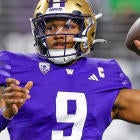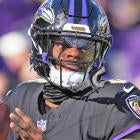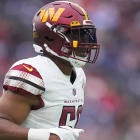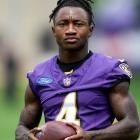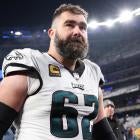
The NFL is often perceived as a young man's game, but recent history at the most important position -- quarterback -- has suggested otherwise. Six of the last eight Super Bowl-winning QBs hoisted the Lombardi Trophy over the age of 30, and one of the other two -- Nick Foles, in 2017 -- was 29. Granted, the unmatched and seemingly ageless Tom Brady is responsible for four different championships during that span. But entering 2022, Brady (45), Aaron Rodgers (38) and a rejuvenated Matthew Stafford (34) seemed to confirm that QB supremacy still belonged to graybeards as much as young guns.
Brady showcased a stronger arm approaching his mid-40s than his mid-20s, Rodgers came in seeking to tie Brett Favre with a third consecutive MVP award, and Stafford's cannon finally delivered on the big stage surrounded by the Rams' all-star lineup. The Broncos and Colts took note, spending big bucks and/or picks to add Russell Wilson (33) and Matt Ryan (37), respectively.
Just over halfway through the 2022 season, it's fair to suggest the veteran wave is, in fact, winding down. In nine quick weeks, the hierarchy of QB power has undergone a dramatic transformation, displacing nearly all of the old-timers with relative newcomers, and confirming the future of the position lies with the younger generation.
Consider that, entering Week 10, seven of the top 10 players in our 2022 QB Power Rankings were 27 or younger; half were 25 or younger; and half were playing on rookie contracts:
| Week 10 Rank | QB | Age |
|---|---|---|
1 | 27 | |
2 | 26 | |
3 | 23 | |
4 | 32 | |
5 | 25 | |
6 | 25 | |
7 | 24 | |
8 | Tom Brady (Buccaneers) | 45 |
9 | 24 | |
10 | 34 |
Disregard the order for this exercise, and focus on the collective: the hottest QBs in today's game are predominantly young, at least relative to the longer "life expectancy" compared to other positions. The average age of these 10 QBs is 28.5. Remove Brady, the anomaly, and it's almost two full years younger: 26.6.
Seattle revelation Geno Smith, meanwhile, isn't your typical 32-year-old starter, having spent the better part of his previous seven seasons on the bench. And here's the kicker, with or without Geno and Brady: being that these are some of the best QBs at present, and being that most of them are conceivably either in or still approaching their prime, the stage has clearly been set for the elite over-30 QBs to be outnumbered.
Every horse eventually loses steam, as evidenced by recent milestone retirements in Pittsburgh (Ben Roethlisberger, 2022); New Orleans (Drew Brees, 2021); and Indianapolis (Philip Rivers, 2021). And, to be clear, only a fool would forecast the actual demise of a machine like Brady, who notably remains in the aforementioned top 10. But even if Brady remains intact amid a potentially deteriorating Buccaneers setup, and even if he doesn't revisit retirement (this time for real) beyond 2022, he all but stands alone among the aging powerhouses who reasonably project as top-shelf material for the foreseeable future.

With The First Pick Newsletter
With The First Pick Newsletter
Prepare for the upcoming NFL Draft with the day’s big stories + mock drafts, big board updates and more.
Thanks for signing up!
Keep an eye on your inbox.
Sorry!
There was an error processing your subscription.
Rodgers is the next-best thing in that regard, and like Brady, his ugly 2022 results have more to do with a shoddy Packers supporting cast than a sudden loss in physical talent. But he might be as close to retirement as Brady; a 2023 return feels inevitable so as to avoid such a potentially sour sendoff, and yet playing well into his 40s is not a guarantee.
As for Smith and Kirk Cousins, who's earned a modicum of additional respect due to his resilience for a 7-1 team, they are good stories but hardly qualify as likely long-term superstars. No, that category belongs almost exclusively to QBs drafted in 2017 or later: Mahomes (2017), Allen (2018), Jackson (2018), Burrow (2020) and Herbert (2020) are all safe bets to be in the MVP conversation both now and for years to come. Tagovailoa (2020) and, even more so, Hurts (2020) have grown in seismic ways to approach that conversation. And that's not accounting for even fresher possibilities like Justin Fields (2021).
Now just hold on a second, you say: aren't there other older QBs who will step up to fill the shoes of the Bradys and Rodgers of the world, reconfirming the position as a post for elderly statesmen? And to that, we say: if there are, they aren't very apparent.
Here's an incomplete list of current or recent starters at least 28 or older, not including Brady and Rodgers: Ryan (37), Stafford (34), Cousins (34), Ryan Tannehill (34), Wilson (33), Smith (32), Derek Carr (31), Jimmy Garoppolo (31), Dak Prescott (29), Carson Wentz (29), Taylor Heinicke (29), Marcus Mariota (29), Jared Goff (28), Jameis Winston (28).
Ryan is spiraling toward retirement after the Colts' dysfunction accelerated his physical decline. Stafford and Wilson have often looked like the least confident versions of themselves amid new scenery or lineup holes in 2022. Ditto for Carr and Tannehill, both respected but unspectacular starters hurting for big-game success. Prescott, the steely soldier who does all the little things well, is the easiest to envision remaining in the upper echelon at his position. But even if we generously grant that one or two from this crop of mostly mid-tier vets will return or ascend to elite form, few would dare suggest this landscape is more promising than that of the younger generation. The new kids, in this case, are just that much better.
The shift is especially notable because it is a deviation from the last decade or so of the general QB pecking order. In the last 10 NFL seasons, for example, the majority of the annual top five QBs by passer rating were 30 or older. In addition to present-day stars like Brady and Rodgers still thriving, the 2012-2021 window saw 30-somethings like Brees, Ryan, Roethlisberger, Rivers, Peyton Manning, Tony Romo, Carson Palmer and Eli Manning pace yearly leaderboards at the position. As opposed to now, where youth is driving the QB production, newbies like Wilson, Andrew Luck and later Mahomes emerged as exceptions.
So where do we go from here? Welcome the sea change, is probably the best advice, for some of the most entertaining football stems from the onslaught of new signal-callers. Just don't forget to appreciate the old-timers, because their days, more than ever, at least at this juncture in the sport, look increasingly numbered. The torch, it's pretty safe to say, has been passed.














